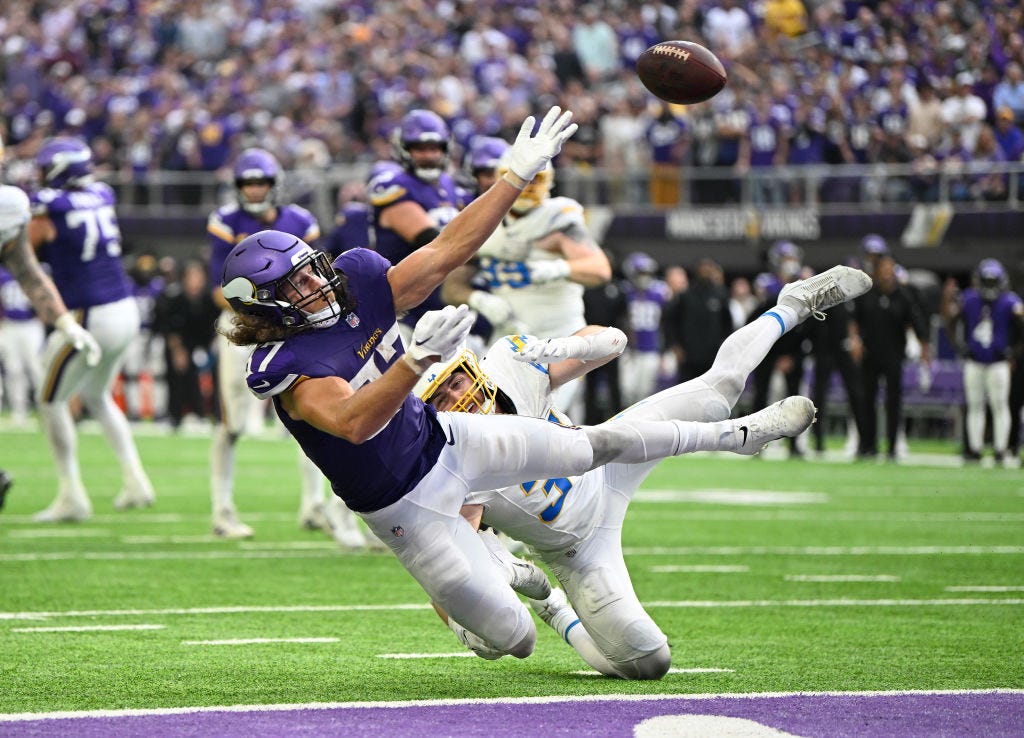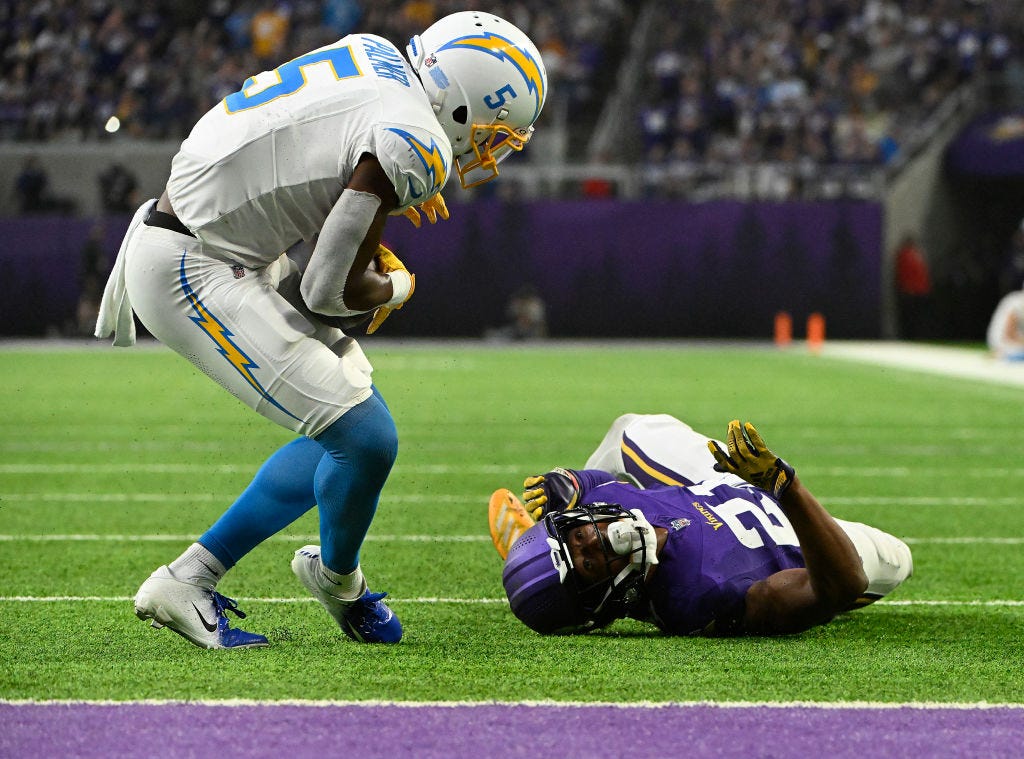In Close Loss to Chargers, Vikings Prove That They Can Still Disappoint
A team addicted to letting its fans down did so again. If this keeps up, the evidence that they could be good will be washed away by the reality that they won't be.
At 0-3, the Vikings are demonstrating that the underlying metrics don’t mean much if they can’t execute on critical fundamentals. “Regression to the mean” is supposed to suggest that teams will play closer to the average performance going forward than that there would be a violent correction in the opposite direction. But the Vikings have always been more about karmic retribution than statistical coherence.
Last year, beneficiaries of an 11-0 close-game record, the Vikings now find themselves losing the games that they won last year, turning around some of the most exciting wins the league has seen. Instead, it’s been a cavalcade of frustration as a fanbase familiar with the taste of unlikely victory has been sharply reminded of the bitter flavor of their usual postgame meals.
The 28-24 loss to the Chargers promised everything that a Vikings-Chargers game portends, with a supercharged fourth quarter, baffling execution errors and outstanding plays from some of the most talented players at their position.
It’s difficult to come up with a takeaway more meaningful than that – a comedy of errors in conjunction with the tragedy of execution is the only way a Chargers-Vikings game could truly end. Keenan Allen finished with a franchise-high 215 receiving yards on 20 targets, with 18 catches. Justin Jefferson continued his 150-plus yard pace to begin the season, keeping him just about on pace for a 2,600-yard receiving season.
Vikings fans saw why film analysts love Justin Herbert so much despite his late-game woes and they were treated to a small taste of the futility he needs to wallow past in order to earn the respect of the casual fan.
The Vikings Final Drive Was a Refutation Of Their 2022
For most people, the game revolved around the final drive and the sequence leading up to the final play. They stopped the Chargers on 4th and 1 in Los Angeles territory – a call that was actually correct by most 4th-down analytics calculators – and immediately attempted to end the game with a shot to K.J. Osborn on a delayed corner route that was just out of his reach.
They followed that with a run for negative yardage – one of their few unsuccessful runs of the day – that might have been the product of miscommunication. Cousins appeared to want to pull the ball on an RPO and throw to Osborn on a quick screen. On 3rd and 11, Cousins tried Jordan Addison in the end zone and hit Asante Samuel Jr.
When the ball deflected off of Akayleb Evans’ hands and into the hands of Joshua Palmer earlier in the game, the result was a touchdown. This time, careening off the hands of Samuel and into the waiting arms of Addison, the ball fell incomplete.
Evans earned much more ire for this set of circumstances than Samuel did, because results shout louder than process. It also happened to occur on a play that Justin Jefferson went down due to cramps, sucking the attention away from the potential touchdown the Vikings lost. Nevertheless, a penalty from Samuel gave the Vikings a new set of downs.
Soon after, a throw to T.J. Hockenson nearly improved the Vikings’ odds, but the ball fell out of his hands. That wouldn’t be the tipped pass that ended up defining the game. Because the Vikings were out of timeouts, the NFL rule preventing fake injuries kicked in – setting the Vikings back five yards to force 2nd and 15.
They earned back five yards on a quick throw to Brandon Powell, they faced 3rd and 10 with 47 seconds left. Hockenson caught the ball for five yards, getting out of bounds to stop the clock at 42 seconds. A conversion would mean the Vikings would have enough time to run four plays into the end zone, in theory.
Hockenson caught another short pass, hitting the turf with 38 seconds left. The Vikings didn’t hurry to the line and were slow to line up. Instead of running a play after the ball had been set by the referee at 30 seconds, they waited for the call to come in from the sideline.
Last year, the Vikings touted their game management coordinator and his weekly meetings with the teams, calling these sessions “Situational Masters.” That coordinator, Ryan Cordell, was supposed to be a big reason that the Vikings went on to win all eleven of their close games in the 2022 regular season.
Cordell was still in the booth as the Vikings scrambled to get their first-down play in, not snapping the ball until there were 12 seconds on the clock.





